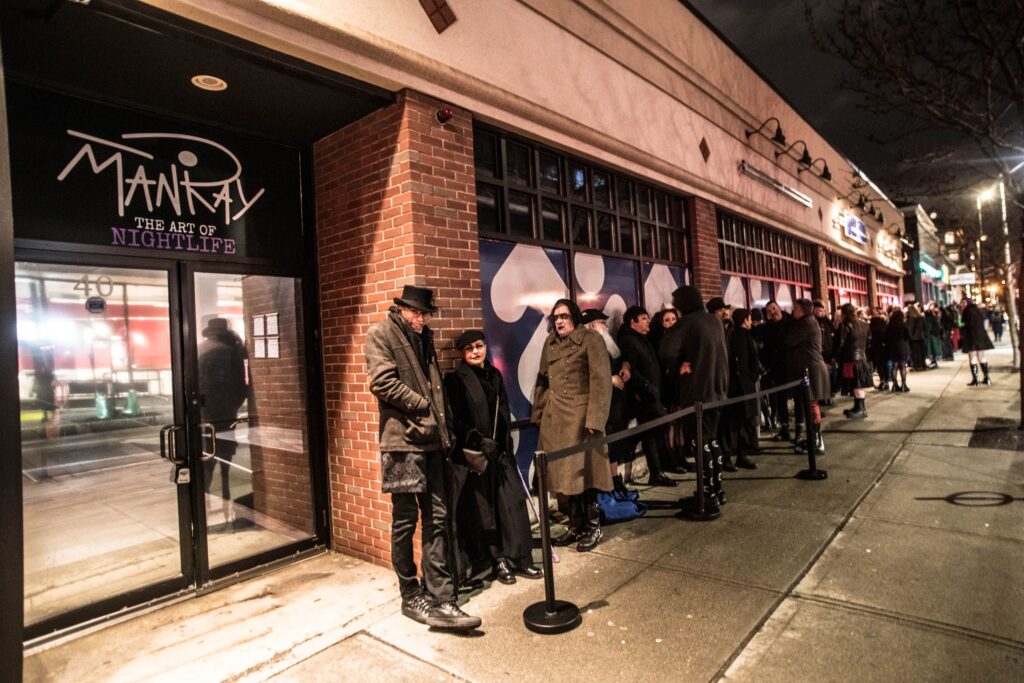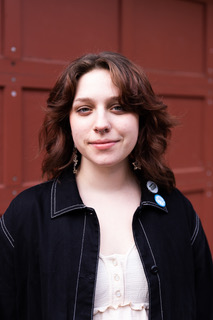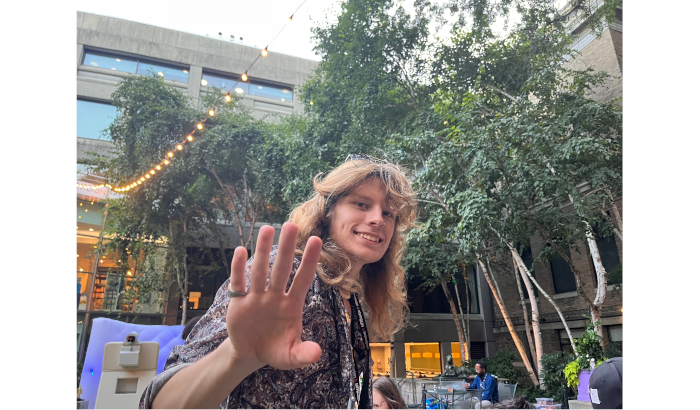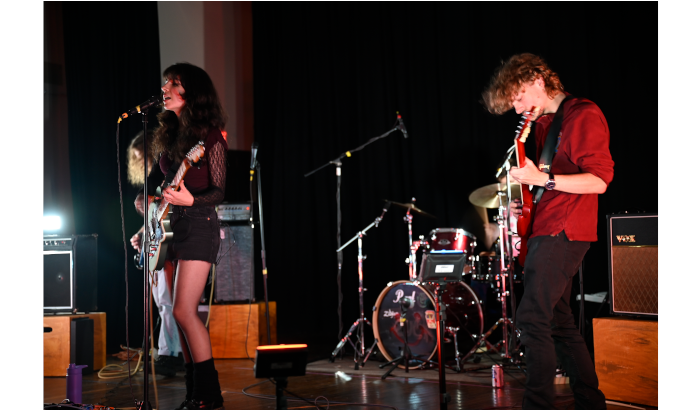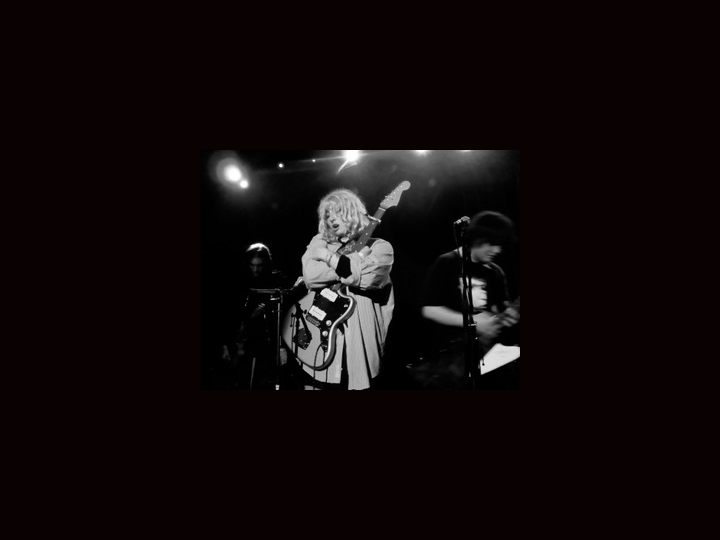How a revived club, ManRay, remains a champion for the underdogs
Cambridge, Mass.—Thursday night in Central Square. The bars are packed with college students and frat bros of all shapes and sizes. Rowdy, loud, borderline annoying—you get the picture.
But in the shadows, there lurk the freaks, the goths, and all of the rejects in between. Their flock follows the magnetic pull of not a simpleton’s sports bar, but a small club just around the corner from the hustle and bustle of the crowds. Sounds of the Cure and Blur echo from Prospect Street, while the clouds of cigarette smoke speak to passersby before anyone else does.
ManRay, originally a gray two-story building in Central Square, opened its doors to its first generation of freaks in the ‘80s. However, due to complications in building ownership, the club closed its doors in 2005.
After nearly 18 years, ManRay reopened to a new crop of outsiders in Jan. 2023, and most of the original staff was there to greet them like family. Among them was longtime DJ Chris Ewen, returning with open arms and a stacked track list.
Ewen was never a DJ by trade. Ewen was working at Harmony House, a record store in his home city of Detroit, when he heard the news: The local alternative bar, Todd’s, had just let go of a DJ and was looking for someone to fill the spot. He had always had a knack for instruments and was—and is—an avid lover of the arts and music. Despite never having DJ’ed before, Ewen had amassed a plethora of records from his old job and applied for the spot.
“It started out from wanting to be a DJ, to then just fibbing my way into a situation and then being good enough to keep that going,” said Ewen with a laugh.
And thus, the club career of Chris Ewen was born. He moved to Massachusetts with a group of friends in 1985 to make music together, and he started his work at ManRay toward the end of that same year.
After their move to Boston, the group was looking for fun nightlife around the city and they stumbled upon an ad for ManRay in the now defunct Phoenix. They immediately picked up and headed to the club, and Ewen felt right at home.
“We walked in and the DJ was playing one of our songs,” said Ewen, laughing.
But ManRay tended to have that effect on people, according to Shawn Driscoll, author of the ManRay oral history “We Are But Your Children.”
Driscoll first attended the club as a college student living in Penbrook. He was not a frequent visitor to Boston, but a friend asked him to go to a dance night in Central Square.
Much like its setup today, ManRay had a different theme each night it was open in its early days—from techno and goth to the Saturday staple of new wave night. Driscoll was heading there for a Saturday night set, unsure of what to expect.
“Have you ever heard the saying, ‘Last night a DJ saved my life’? Well, that’s Chris Ewen in a nutshell,” said Driscoll.
As they walked up to the building, the cold winter air was met with the heat and bass emanating from the gray building that was ManRay. The purple walls and whiffs of patchouli and cigarettes overwhelmed his senses immediately. Regardless of the smells’ ferocity, to Driscoll it was the smell of home.
He walked through to the back room and there, spinning the Smiths and Dexys Midnight Runners, was Chris Ewen.
“Two words that come to mind with every interview I did for the book—two words that I’m going to give you that are not normally indicative of a club, and that’s ‘safe’ and ‘home,’” said Driscoll.
It became a weekly ritual for Driscoll. After that first night, Driscoll would pull up with 30 to 40 people every Saturday for Ewen’s new wave night in what became a sacred space for those who craved freedom and authenticity.
“ManRay was a place that you went every single week … and you saw all of your friends and you were able to just kind of let loose and let yourself be your authentic self.”
“You have a lot of kids coming off the bus or train or a plane and going to places like Emerson or BU or MIT or Harvard. And maybe they’re LGBTQ+. Maybe they’re goth. Maybe they’re industrial. Maybe they’re just different,” said Driscoll. “And they didn’t have a place where they felt safe or they could go to in their hometown. Here in Cambridge, at this club called ManRay, the doors were open for them to wear the clothes they wanted to wear.”
And it all began with Don Holland, the original owner of ManRay. Holland was described by others as a businessman but also as an open-minded guy. So, when people came to him to discuss theme nights or opportunities for representation of subcultures and different groups through themed events, Holland was all for trying things out.
“I view Don in the life changing business. He changed lives,” said Driscoll. “Not just the people who are DJs or club promoters or dancers or artistic people. He changed lives for people that had a place to go that they didn’t have before.”
But what functioned as a safe space for many eventually spun its last set in 2005.
Club owner Don Holland received the news that the building, which he did not own, was being sold and therefore, ManRay had to close its doors.
The news initially came as a shock, and despite constant whispers of closure, Ewen was taken by surprise. There was a bit of fear and uncertainty over what to do next, but plans soon started to take place.
For the next few years, Holland would bring Ewen to scout out new locations around Boston, serious about his promise to reopen. But it seemed that Holland found a space, Ewen would come look at it and it was never the place.
And although the hope of a new ManRay remained, those 18 years went by with no luck.
He began to take his theme nights out into the world. “Heroes,” Ewen’s new wave dance night, moved around to the Middle East, Axis, and Machine. Without the club itself, little pieces of ManRay were scattered throughout the city to bar and club patrons everywhere. Some people understood what Ewen was doing. Others didn’t. The only place where everyone got it without question was no more.
It was not until 2022 that a light peeked through at the end of a very long and arduous tunnel. Holland found a little spot, 40 Prospect Street in Cambridge, to house a new generation of club goers.
Amidst bar and club closures following the height of the pandemic, the safe spaces dedicated to queer people and many who felt like they just didn’t belong anywhere else were few and far between, including some of the places that Ewen worked after ManRay’s closure like Machine and others throughout the city like the Boston Eagle.
ManRay’s resurrection came at a time when everyone needed it—a space to see old friends and a space to be themselves at a time of a lot of uncertainty regarding human rights.
Somewhere in the heart of it all, in the new spot in Cambridge, is Chris Ewen playing songs that not everyone out there likes, or maybe songs they don’t even know. But out there, on the dance floor, maybe there’s one song that makes someone feel at home—in the space, in Cambridge and in their own skin. And maybe it was the DJ that saved their life that night.
This article was produced for HorizonMass, the independent, student-driven, news outlet of the Boston Institute for Nonprofit Journalism, and is syndicated by BINJ’s MassWire news service.
Julia Norkus (she/they) is a journalist and photographer at Emerson College. Their focus lays with the arts, with a passion for music and performance. As an Emerson student, she acts as Editor-in-Chief of WECB.fm’s Milk Crate, a music publication, as well as the host of WECB.fm radio show “Lavender Tea”. In their free time, Norkus loves bike rides, attending local shows in Allston and collaging.

